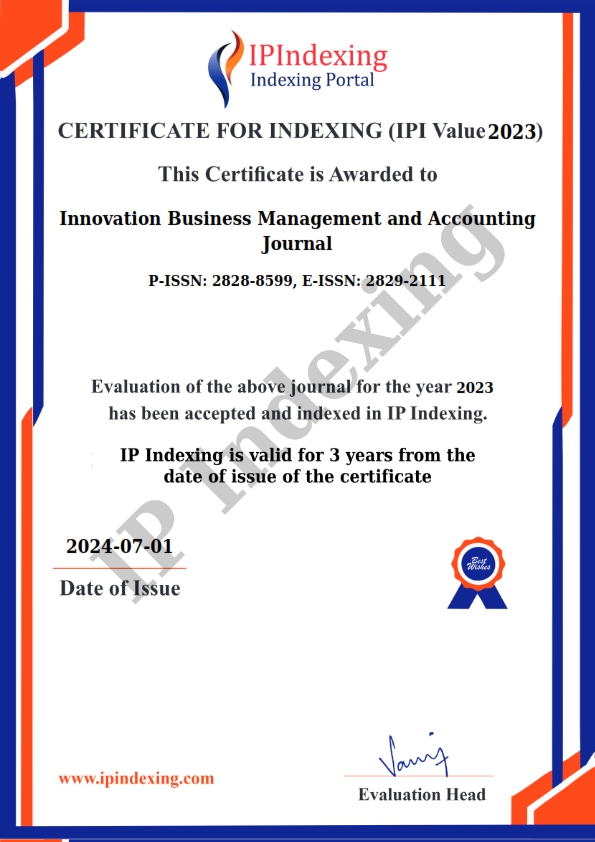The Role of Lecturers in Society 5.0 for Advancing Indonesia
DOI:
https://doi.org/10.56070/ibmaj.icals.2024.002Keywords:
Lecturer, Sosiety, Technology, Human RecourcesAbstract
Society 5.0, a Japanese concept aiming to integrate physical and digital worlds to enhance human quality of life, contrasts with Industry 4.0's focus on industrial automation. In Indonesia, this paradigm shift underscores the pivotal role of education, particularly the role of lecturers, in preparing a generation capable of adapting to and advancing in this era. This paper explores the strategic role of lecturers in fostering superior human resources for an advanced Indonesia in the Society 5.0 context. It employs qualitative library research and content analysis to examine the role of lecturers as educators, innovators, researchers, and career mentors. Key aspects include integrating technology into teaching, creating relevant curricula, conducting impactful research, and preparing students for global challenges. Despite facing challenges such as limited access to technology and inadequate training, lecturers are essential in leveraging technological advancements to produce adaptable, competent graduates. The paper concludes that addressing these challenges through infrastructure investment and continuous professional development is crucial for Indonesia to thrive in the Society 5.0 era.
Downloads
References
Fukuyama, M. (2018). Society 5.0: Aiming for a New Human-Centered Society. Japan Journal of Social Innovation.
Fukuyama, M. (2018). Society 5.0: Aiming for a New Human-Centered Society. Japan Journal of Social Innovation.
Ministry of Education, Culture, Sports, Science and Technology Japan. (2019). Society 5.0.
Ministry of Education, Culture, Sports, Science and Technology Japan. (2019). Society 5.0: Aiming for a Human-Centered Society.
Muhardi, Muhardi. "Kontribusi pendidikan dalam meningkatkan kualitas bangsa Indonesia." Mimbar: Jurnal Sosial dan Pembangunan 20.4 (2004): 478-492.
Schwab, K. (2016). The Fourth Industrial Revolution. World Economic Forum.
Schwab, K. (2016). The Fourth Industrial Revolution. World Economic Forum.
Syahputri, Icca Bela, and Katimin Katimin. "Pengaruh Aktivis Mahasiswa Dalam Perubahan Sosial Politik Di Era Digital 5.0." Ganaya: Jurnal Ilmu Sosial dan Humaniora 7.4 (2024): 25-36.
Tung, Khoe Yao. "Simphoni Sedih Pendidikan Nasional." Jakarta: Abdi Tandur (2002).
World Economic Forum. (2018). The Role of Higher Education in Society 5.0.
Renata, Sarah, and T. S. Salsabila. "Penerapan Dasar Society 5.0 Di Bidang Pendidikan (Implementation Of Society 5.0 In Education)." Diakses Dari: Https://Www. Researchgate. Net/Publication/363049924_Penerapan_Dasar_Society_50_Di_Bidang_Pendidikan_Implementation_Of_Society_50_In_Education (2022).
Junis, Mara Aulia, Hilda Nurul Fadillah, and Ichsan Fauzi Rachman. "Transformasi Sosial di Era Digital: Peran Media Sosial dalam Meningkatkan Kesadaran terhadap Tujuan Pembangunan Berkelanjutan 2030." Jurnal Ilmiah Manajemen Ekonomi Dan Akuntansi (JIMEA) 1.3 (2024): 31-39.
Sumadi, Mufti Istal Thofa Bhakti Nurroji, Raka Putra, and Amrie Firmansyah. "Peran perkembangan teknologi pada profesi akuntan dalam menghadapi industri 4.0 dan society 5.0." Journal of Law, Administration, and Social Science 2.1 (2022): 56-68.
Pertiwi, Triani Patra, et al. "Strategi Pengembangan Kompetensi Dosen Untuk Menanggapi Tantangan Pendidikan Abad Ke-21." Jurnal Review Pendidikan Dan Pengajaran (JRPP) 7.1 (2024): 2586-2596.
Parwati, Ni Putu Yuniarika, and I. Nyoman Bayu Pramartha. "Strategi guru sejarah dalam menghadapi tantangan pendidikan indonesia di era society 5.0." Widyadari 22.1 (2021): 143-158.
Downloads
Published
How to Cite
Issue
Section
License
Copyright (c) 2025 Umi Zulfa, M. Hanif, Ismah

This work is licensed under a Creative Commons Attribution-ShareAlike 4.0 International License.


